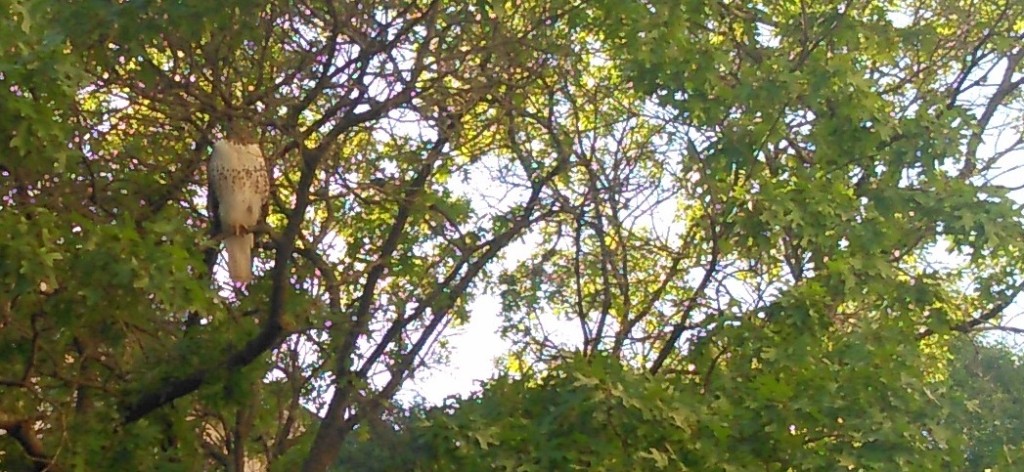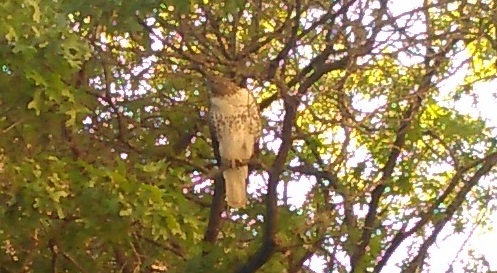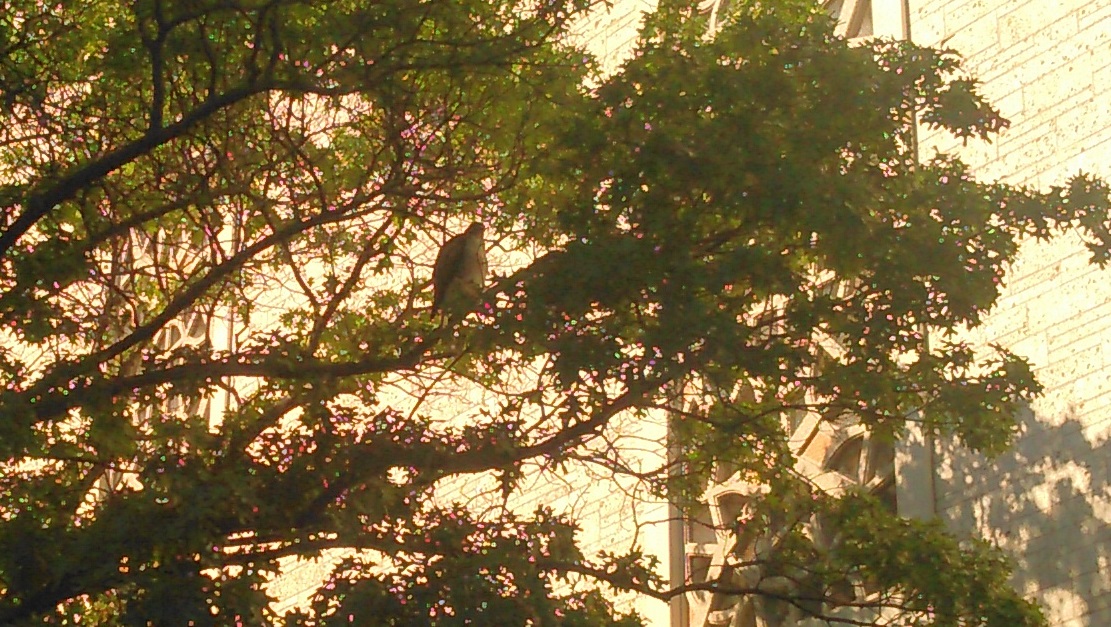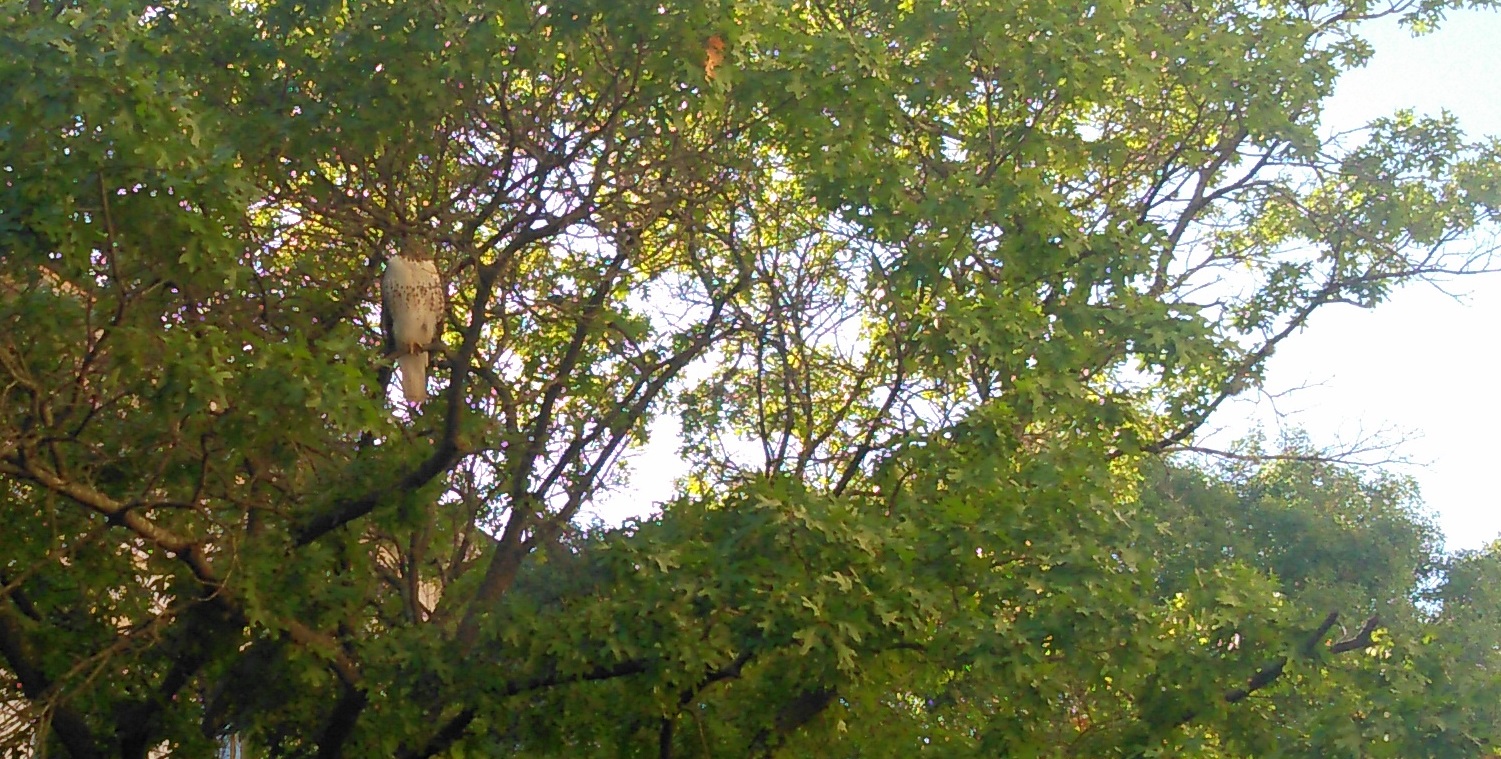That’s a broad-winged hawk, making a pit stop here at the University of Texas at Austin, probably before heading to Mexico for the winter.
In literature, particularly the Hellenic variety, bird-is-the-word, that is, any unusual sighting or behavior of a feathered figure, was taken to be an omen for something:
[230] Then with an angry glance from beneath his brows spake to him Hector of the flashing helm: “Polydamas, this that thou sayest is no longer to my pleasure; yea, thou knowest how to devise better words than these. But if thou verily speakest thus in earnest, then of a surety have the gods themselves destroyed thy wits, [235] seeing thou biddest me forget the counsels of loud-thundering Zeus, that himself promised me and bowed his head thereto. But thou biddest us be obedient to birds long of wing, that I regard not, nor take thought thereof, whether they fare to the right, toward the Dawn and the sun, [240] or to the left toward the murky darkness. nay, for us, let us be obedient to the counsel of great Zeus, that is king over all mortals and immortals. One omen is best, to fight for one’s country. Wherefore dost thou fear war and battle? [245] For if the rest of us be slain one and all at the ships of the Argives, yet is there no fear that thou shouldest perish,—for thy heart is—not staunch in fight nor warlike.
(Homer, Iliad, (XII, 230–45) in The Iliad with an English Translation by A.T. Murray, Ph.D. in two volumes. Cambridge, MA., Harvard University Press; London, William Heinemann, Ltd. 1924. )
Here, Hektor’s rebuke against the interpretation of the eagle-serpent omen basically seems to say, “I have what God/Zeus told me—and because I already have it, signs and omens and interpretations thereof mean nothing.â€
The Odyssey is bookend with bird omens, beginning with Book II:
Without atonement then should ye perish within my halls.†So spoke Telemachus, and in answer Zeus, whose voice is borne afar,1 sent forth two eagles, flying from on high, from a mountain peak. For a time they flew swift as the blasts of the wind side by side with wings outspread; [150] but when they reached the middle of the many-voiced assembly, then they wheeled about, flapping their wings rapidly, and down on the heads of all they looked, and death was in their glare. Then they tore with their talons one another’s cheeks and necks on either side, and darted away to the right across the houses and the city of the men. [155] But they were seized with wonder at the birds when their eyes beheld them, and pondered in their hearts on what was to come to pass. Then among them spoke the old lord Halitherses, son of Mastor, for he surpassed all men of his day in knowledge of birds and in uttering words of fate. [160] He with good intent addressed their assembly, and spoke among them: “Hearken now to me, men of Ithaca, to the word that I shall say; and to the wooers especially do I declare and announce these things, since on them a great woe is rolling. For Odysseus shall not long be away from his friends, but even now, methinks, [165] he is near, and is sowing death and fate for these men, one and all. Aye, and to many others of us also who dwell in clear-seen Ithaca will he be a bane. But long ere that let us take thought how we may make an end of this—or rather let them of themselves make an end, for this is straightway the better course for them. [170] Not as one untried do I prophesy, but with sure knowledge. For unto Odysseus I declare that all things are fulfilled even as I told him, when the Argives embarked for Ilios and with them went Odysseus of many wiles. I declared that after suffering many ills and losing all his comrades he would come home in the twentieth year [175] unknown to all; and lo, all this is now being brought to pass.†(Homer, Odyssey, II, 150-75) The Odyssey with an English Translation by A.T. Murray, PH.D. in two volumes. Cambridge, MA., Harvard University Press; London, William Heinemann, Ltd. 1919.)
Then again at Book XX:
[240] Thus they spoke to one another, but the wooers meanwhile were plotting death and fate for Telemachus; howbeit there came to them a bird on their left, an eagle of lofty flight, clutching a timid dove. Then Amphinomus spoke in their assembly, and said: [245] “Friends, this plan of ours will not run to our liking, even the slaying of Telemachus; nay, let us bethink us of the feast.†(Homer, Odyssey, XX, 240-45)
Centuries later, Plutarch imparts:
But when they set out to establish their city, a dispute at once arose concerning the site. Romulus, accordingly, built Roma Quadrata (which means square),and wished to have the city on that site; but Remus laid out a strong precinct on the Aventine hill, which was named from him Remonium, but now is called Rignarium.
Agreeing to settle their quarrel by the flight of birds of omen,1 and taking their seats on the ground apart from one another, six vultures, they say, were seen by Remus, and twice that number by Romulus. Some, however, say that whereas Remus truly saw his six, Romulus lied about his twelve, but that when Remus came to him, then he did see the twelve. Hence it is that at the present time also the Romans chiefly regard vultures when they take auguries from the flight of birds.
Herodorus Ponticus relates that Hercules also was glad to see a vulture present itself when he was upon an exploit. For it is the least harmful of all creatures, injures no grain, fruit-tree, or cattle, and lives on carrion. But it does not kill or maltreat anything that has life, and as for birds, it will not touch them even when they are dead, since they are of its own species. But eagles, owls, and hawks smite their own kind when alive, and kill them. And yet, in the words of Aeschylus:—1
How shall a bird that preys on fellow bird be clean?
Besides, other birds are, so to speak, always in our eyes, and let themselves be seen continually; but the vulture is a rare sight, and it is not easy to come upon a vulture’s young, nay, some men have been led into a strange suspicion that the birds come from some other and foreign land to visit us here, so rare and intermittent is their appearance, which soothsayers think should be true of what does not present itself naturally, nor spontaneously, but by a divine sending (Plutarch a.k.a Lucius Mestrius Plutarchus, Parallel Lives – Volume I. Translated by Bernadotte Perrin. Loeb’s: Harvard UP. 1928. 1982. “Romulus,†ix, 3–7, pp. 115–17)





0 comments ↓
There are no comments yet...Kick things off by filling out the form below.
Leave a Comment